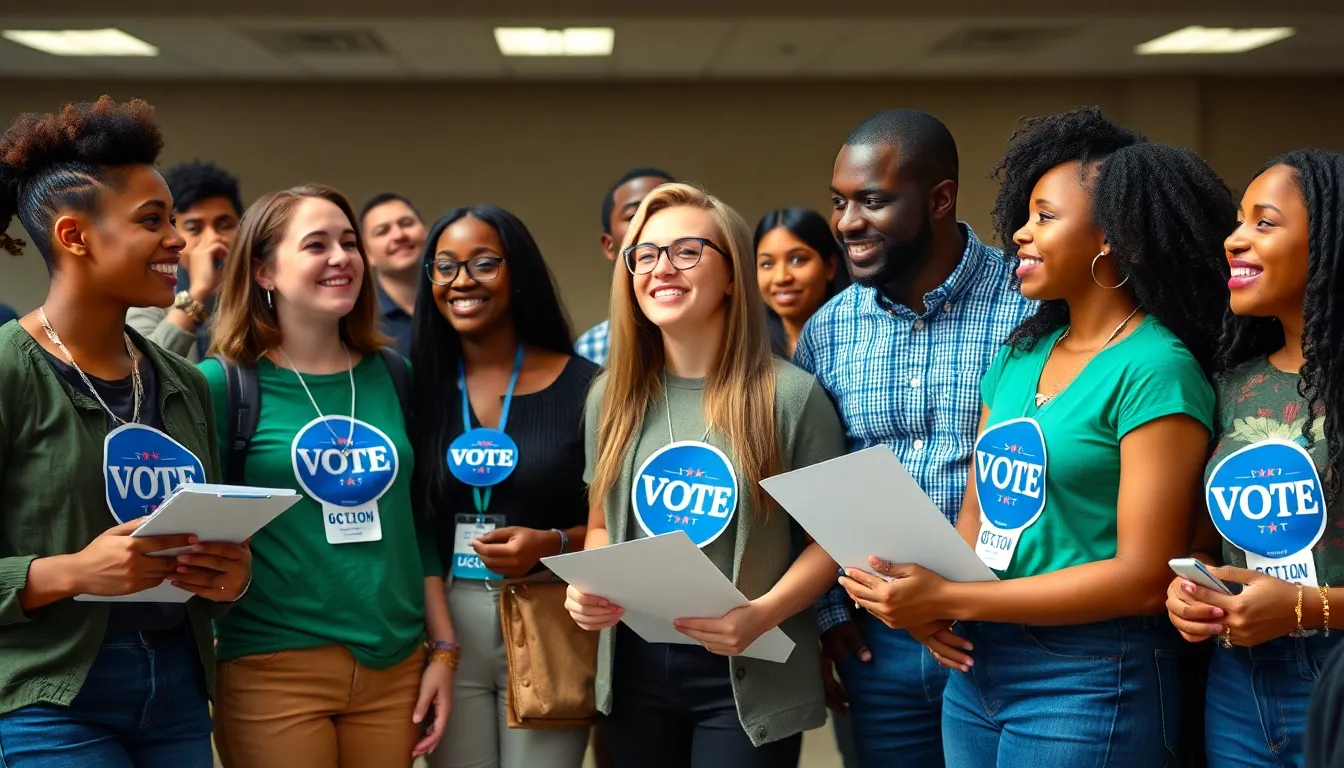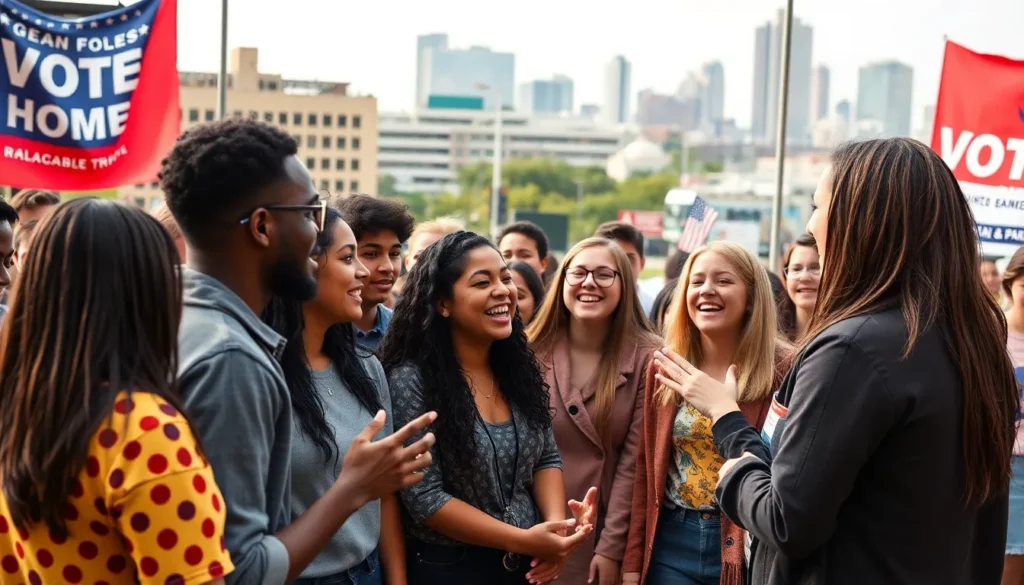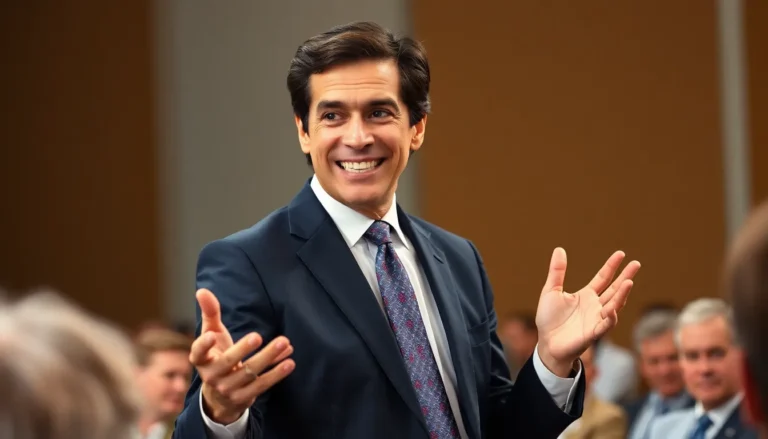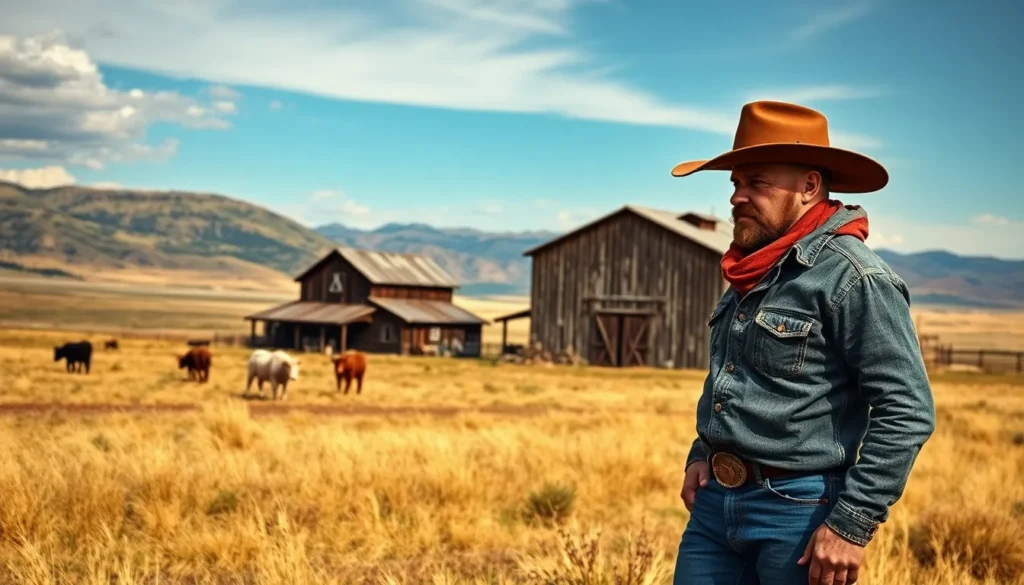Georgia’s political landscape has become a focal point in recent years, sparking debates about whether it leans red or blue. Historically a Republican stronghold, the state has seen a shift as demographics change and voter engagement rises. This transformation has made Georgia a battleground state, captivating the attention of political analysts and voters alike.
With the 2020 presidential election and subsequent races, Georgia’s role in national politics has only intensified. The outcomes of these elections have raised questions about its political identity. Is Georgia firmly in the red camp, or is it evolving into a blue state? Understanding this dynamic is crucial for anyone interested in the future of American politics.
Table of Contents
ToggleOverview of Georgia’s Political Landscape
Georgia’s political environment has undergone significant change, transforming it from a Republican stronghold into a competitive battleground. The state’s evolving demographics and heightened voter participation play critical roles in this dynamic.
Historical Context
Georgia’s political history has predominantly favored the Republican Party since the late 20th century. In 2000, Georgia’s electoral votes went to the Republican candidate, and this trend continued for several presidential elections. However, demographic shifts, including an increase in urban populations and diversity, began influencing political dynamics. By 2018, statewide elections started to show competitive races, with notable Democratic gains, indicating a potential shift in voter allegiance. The 2020 presidential election became a turning point, as Georgia flipped for the first time since 1992, contributing to Joe Biden’s victory.
Recent Elections
Recent elections have underscored Georgia’s status as a battleground state. The state played a pivotal role in the 2020 presidential election, with Biden winning by just under 12,000 votes. In 2021, the U.S. Senate runoff elections further highlighted this shift, where Democrats Jon Ossoff and Raphael Warnock defeated incumbent Republicans. These recent results indicate increasing competition between the two major parties, as voter turnout, particularly among younger and minority demographics, has surged. Ongoing political efforts, such as grassroots campaigns, continue shaping Georgia’s evolving political landscape.
Key Demographics Influencing Politics

Georgia’s demographics play a crucial role in shaping its political landscape, impacting voter behavior and election outcomes. Understanding these demographics reveals the complexities behind the state’s transition from a Republican stronghold to a competitive battleground.
Urban vs. Rural Divide
Urban areas in Georgia, including cities like Atlanta and Savannah, lean Democratic. High population density, diverse communities, and progressive viewpoints characterize these cities. In contrast, rural areas predominantly support Republican candidates. Factors such as agricultural economy reliance and traditional values contribute to this conservative alignment. This divide creates a significant electoral contrast, influencing campaign strategies and party support across the state.
Age and Ethnicity Trends
Youth engagement significantly affects Georgia’s political dynamics. Voters aged 18 to 29 exhibited a marked increase in turnout during the 2020 and 2021 elections. Additionally, demographics reveal a more diverse electorate. The state’s growing Hispanic and African American populations tend to favor Democratic candidates. As younger and more diverse voters participate in elections, their influence on political outcomes becomes increasingly pronounced, potentially paving the way for further shifts in Georgia’s political affiliation.
Major Political Parties in Georgia
Georgia’s political landscape is shaped significantly by the two major parties: the Republican Party and the Democratic Party. Each party’s presence reflects the state’s evolving demographics and regional divides.
Republican Party Presence
The Republican Party has a long-standing history of dominance in Georgia, particularly in rural areas. Republicans emphasize traditional values, pro-business policies, and limited government. The party has secured a substantial number of statewide elected offices, including the governorship and both U.S. Senate seats prior to the recent election cycle. Notable figures, such as former Governor Nathan Deal, played key roles in reinforcing Republican policies. The party’s stronghold remains intact mainly in rural counties, where conservative views are more prevalent. Voter mobilization efforts focus on appealing to constituents through grassroots initiatives and maintaining strong party loyalty.
Democratic Party Influence
The Democratic Party has seen a surge in influence, particularly in urban centers like Atlanta and Savannah. Democrats advocate for issues such as healthcare access, social justice, and progressive taxation. The party’s success in the 2020 presidential election, with Joe Biden winning Georgia, marks a critical shift in the state’s political climate. High-profile Democratic candidates, such as Stacey Abrams, have galvanized support and increased voter engagement among younger and minority communities. As demographic trends continue to evolve, the Democratic Party seeks to leverage greater participation from these groups, which are vital to its electoral success in state and local elections. The combination of grassroots organizing and targeted outreach has made the Democratic Party a formidable force in Georgia’s rapidly changing political arena.
Notable Political Figures
Georgia’s political landscape features a mix of influential statewide leaders and local figures shaping the state’s evolving dynamics.
Statewide Leaders
Stacey Abrams serves as a prominent figure within the Democratic Party, advocating for voter access and civil rights. She founded Fair Fight Action, an organization aimed at combating voter suppression. Abrams’ efforts to mobilize younger and minority voters have garnered national attention and significantly impacted elections. Brian Kemp, the current Republican governor, represents the party’s traditional values and business-friendly policies. Kemp’s administration has faced scrutiny, particularly regarding voting laws, which reaffirmed the heightened partisan divide in the state.
Local Influencers
Several local influencers contribute to Georgia’s political scene. Lucy McBath, a Democratic U.S. Representative, emphasizes issues like gun control and social justice, motivated by personal experiences. Her advocacy resonates with many constituents, reflecting shifting values among Georgia’s electorate. On the Republican side, Vernon Jones, a former state representative, has gained recognition for his outspoken views and appeals to conservative voters. Local figures like these underscore the complex political fabric of Georgia, where grassroots movements and community leaders play essential roles in shaping public opinion and election outcomes.
Current Political Climate
Georgia’s political climate reflects a complex and evolving landscape, characterized by shifting demographics and voter engagement. The state finds itself at the center of national political discourse, with both major parties vying for influence.
Key Issues at Stake
Several key issues dominate Georgia’s political discussions, shaping voter opinions and preferences.
- Voting Rights: The debate over access to the ballot has intensified, with advocates pushing for expanded rights and opponents emphasizing election security measures.
- Healthcare: Access to affordable healthcare remains a significant concern, with Democrats advocating for expanded coverage and Republicans focusing on reducing costs and improving quality.
- Education: Public education funding and school choice are hot-button topics, with varying views on how best to allocate resources for student success.
- Economic Development: Job creation and economic opportunity drive political discourse, with emphasis on attracting businesses while addressing the needs of local communities.
- Social Justice: Issues of racial equality and police reform resonate strongly among voters, influencing the political stances taken by candidates across party lines.
Voter Sentiment and Trends
Voter sentiment in Georgia reveals significant trends impacting the electoral landscape.
- Increased Turnout: Recent elections have seen a surge in voter turnout, particularly among younger and minority populations, indicating a growing engagement in the democratic process.
- Partisan Polarization: Growing divisions between urban and rural voters highlight stark differences in priorities and political alignment, with urban areas leaning Democratic and rural areas favoring Republicans.
- Independent Voters: A notable increase in independent voters reflects dissatisfaction with both major parties, necessitating campaigns tailored to address their concerns.
- Shifts in Demographics: The rise of diverse demographics, including Hispanic and African American communities, has contributed to altering voting patterns, with these groups increasingly leaning Democratic.
- Influence of Grassroots Movements: Grassroots organizations have played a critical role in mobilizing voters and shaping political discourse, especially regarding social justice and voting rights.
This intricate and ever-changing political climate illustrates Georgia’s critical relevance in upcoming elections.
Georgia’s political landscape is undeniably complex and dynamic. As the state continues to experience demographic shifts and increased voter engagement, its status as a battleground state becomes more pronounced. The contrasting political affiliations between urban and rural areas illustrate the ongoing struggle for influence among both major parties.
With key figures driving change and grassroots movements mobilizing voters, Georgia’s future in national politics remains uncertain yet exciting. The evolving demographics and voter sentiments will play a crucial role in shaping upcoming elections, making Georgia a state to watch in the years ahead.








